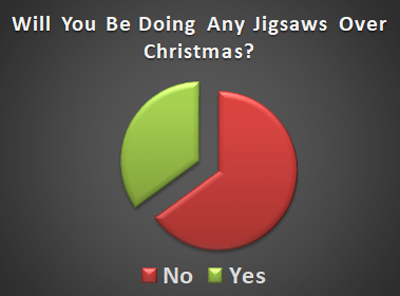Do Children Still Like Jigsaws?
Jigsaws at Christmas

Christmas has been and gone. Although, Christmas 2020 was unlike any other. Families traditionally come together over the festive period but this year that was less possible due to the Covid-19 restrictions. Despite all that, I hope you and your family had a good one.
Jigsaws were once a traditional Christmas gift. They are a great way to pass away the hours, and that could be very welcome with the country entering a second phase of lockdown restrictions today. Those who were given jigsaws for Christmas may find them a welcome distraction over the coming months.
For our latest survey we decided to find out whether jigsaws have maintained their popularity or whether their place has been lost to more modern diversions, such as video games and the like. To do this we asked 1,930 children between the ages of 5 and 17 the following question: “Are you expecting you and the people in your home to do any jigsaw puzzles over Christmas?”
The question was a simple one with only two possible answers: “Yes” or “No”. And here are the results…
- 65% of children did not expect to do a jigsaw over Christmas
- 35% thought that they would be putting a jigsaw together
So, just over a third of children still do jigsaws. That’s not a small number by any means. Which shows how jigsaws have managed to stand the test of time, even when up against more modern toys, games and gizmos.
History of Jigsaws
Jigsaws were invented in the 1760s by cartographer John Spilsbury. He intended for them to be an aid to learning geography as the first ones were made by mounting maps on sheets of wood and cutting pieces around the borders of countries. Children were then challenged to fit these countries together in the correct places to rebuild the dissected maps. For that reason the first jigsaws were called “dissected maps”. These proved quite popular amongst the well off and the children of George III were known to use them.
The name “jigsaw” is a misnomer. It was first used to describe the puzzles in the latter part of the 19th Century, but the puzzles of that time were made using fretsaws. “Fretsaws” would be a more appropriate name in my opinion. Not only because that is how they were made, but also because of the amount of fret and anguish the harder ones can case us!
It was around this time that cardboard started to be used alongside wood. These cheaper jigsaws were less popular at first. The middle-and upper classes who were the main market, found them of inferior quality. However, the economic situation formed during the Great Depression brought cardboard jigsaws into their own. A cheap form of entertainment for children.
Their popularity booming, jigsaws then started to be aimed at adults as well as children. Designs became more complex, pieces smaller, and the puzzles themselves larger. And now, with the world being forced to remain at home, jigsaws have reached a new peak in sales. The surge in jigsaws over 2020 is greater than at any time since the 1920s.
The Benefits of Jigsaws
Jigsaws have moved on a long way since those early dissected maps. They are proven to be beneficial in brain development as they involve both logic and creativity – the specialities of each side of the brain.
Jigsaws are also helpful in preventing Alzheimer’s. The Alzheimer Society of Canada states that doing jigsaw puzzles can help keep the brain active and may contribute to reducing the risk of developing the disease. There are many other benefits to jigsaws which you can learn about by reading this article. Another great read can be found at Everything Jigsaw Puzzles.
More Survey ResultsFull Results of our "Do Children Still Like Jigsaws” Survey
Here are the results from the 1,930 children who answered our question "Are you expecting you and the people in your home to do any jigsaw puzzles over Christmas?". The survey was conducted in the two weeks ending December 31st, 2020.
| Are you expecting you and the people in your home to do any jigsaw puzzles over Christmas? | Percentage of Respondents |
|---|---|
| Yes | 35% |
| No | 65% |



